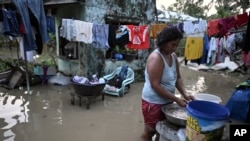The residents of 2,500 villages were ordered to evacuate their homes as severe tropical storm Toraji approached the northern Philippines, the government said Sunday, after three massive cyclones battered the country in less than a month.
Nearly 700,000 people are still sheltering at evacuation centers or with relatives after their homes were destroyed by tropical cyclones Trami, Kong-rey and Yinxing, according to government figures given to AFP.
The previous trio of storms killed 159 people and with Toraji due to make landfall on Monday, people living in 2,500 villages across the northern regions of Ilocos, Cagayan Valley and Cordillera have been ordered to evacuate, Interior and Local Government Secretary Jonvic Remulla said.
"The soil in those areas is now very saturated and the risk of landslides is very high," Remulla said in a briefing on Sunday.
"We cannot stress it enough, the evacuation orders are important."
Toraji, packing maximum sustained wind speeds of 110 kilometers (68 miles) per hour, was expected to unleash torrential rains and strong winds when it makes landfall over the northern provinces of Aurora or Isabela, the state weather agency said.
The military and police have also prepositioned at least 14 aircraft for rescue and transportation of food in areas that could be isolated.
Sea travel has also been suspended and dams have started to release water in advance to prevent flooding, Remulla said.
Toraji's approach has complicated recovery efforts from the three previous storms.
On Thursday, Typhoon Yinxing slammed into the country's north coast. It left a 12-year-old girl dead and damaged houses and buildings.
Around 51,000 people are still displaced in badly-hit Cagayan province north of Manila, with at least seven of its towns still without power, the provincial disaster agency said in a report Sunday.
Weeks before that, Severe Tropical Storm Trami and Super Typhoon Kong-rey together left 158 people dead, the national disaster agency said, with most of that tally attributed to Trami.
About 20 big storms and typhoons hit the archipelago nation or its surrounding waters each year.
A recent study showed that storms in the Asia-Pacific region are increasingly forming closer to coastlines, intensifying more rapidly and lasting longer over land due to climate change.




